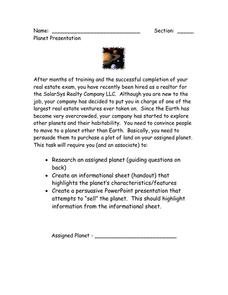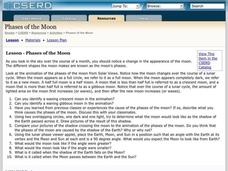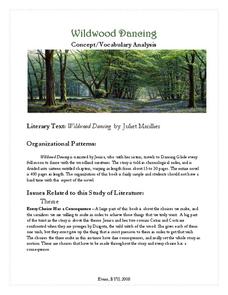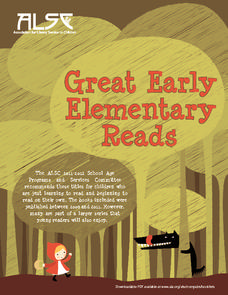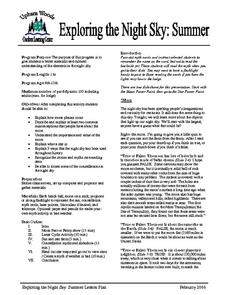Curated OER
Demonstrating Moon Phases
Third graders participate in a demonstration of the moon's phases. In this moon phase instructional activity, 3rd graders watch as the teacher demonstrates moon phases with a bright light and a Styrofoam ball. They answer questions...
Poetry4kids
How to Create Book Spine Poetry
Can you create a poem without writing a word! With found poetry, you can! Practice one version of found poetry with a lesson on book spine poems. Learners create poems by stacking books and reading the lines created by their spine titles.
Alabama Learning Exchange
The Moon
Young scholars explore the phases of the moon. In this solar system lesson, students listen to several books about the moon including The Moon Book by Gail Gibbons. Young scholars complete a KWL activity concerning the phases of the moon...
Institute of Electrical and Electronics Engineers
Biomimicry in Engineering
Take a look with your class at how nature supplies inspiration to engineers. In cooperative groups, youngsters research biomimicry and then develop a system that would help support people living on the moon. Each team also considers...
Mr. Jones's Science Class
Planet Presentation
Upper-elementary astronomers take on the role of interplanetary real estate salesmen. They research an assigned planet and create a PowerPoint to persuade the rest of the class to purchase property and move there. This fun project would...
Curated OER
Breaking News English: Moon Water
For this water on the moon worksheet, students read the article, answer true and false questions, complete synonym matching, complete phrase matching, complete a gap fill, answer short answer questions, answer discussion questions,...
Curated OER
Tour of the Solar System
Learners engage in science, math, and language activities as they do research on the components of the solar system. The class begins with some anticipatory activities and discussions before it is divided into small groups to conduct...
S2tem Centers SC
Seasons
Winter, spring, summer, and fall—take the learning of the seasons beyond the elementary level to the middle school classroom. Curious learners begin by watching videos about the seasons and the rotation of planet Earth. Then,...
Curated OER
Trip to Moon, Mars, or Wherever!
Learners play a game relating to outer space. This game can be adapted for higher grades.
Workforce Solutions
A Colony for Lunar Living
Two lessons explore the possibility of living on the moon. First, scholars read various scenarios to identify which careers would best transfer to life in space. Finally, pupils examine a website to locate items made for outer space,...
It's About Time
Communication Through Space
If humans do find aliens, how would we communicate with them? An intriguing lesson walks through some of the challenges associated with this question. How long would a message take to reach a specific destination, what language...
Laboratory for Atmospheric and Space Physics
Space Travel Guide
Looking to take a trip? Why not go to space? Here, scholars take on the role as travel agent to create a guide to their favorite planet including travel tips and sightseeing recommendations.
University of Colorado
Space Travel Guide
Neptune takes 164.8 Earth years to travel around the sun. In the fifth of 22 lessons, young scientists create a travel guide to a planet in our solar system. They provide tips for others on what to bring, what they see, and their...
Florida International University
The Good, the Bad and the Nasty Tasting
Examine the benefits of chemical defense mechanisms. Organisms in oceans use chemicals to ward off predators. Duplicate this adaptation using a hands-on experiment in which you ward off your predators (your pupils) with some...
Curated OER
Phases of the Moon
Students create a model of the phases of the Moon by giving students pictures of the phases of the Moon, a picture of the Earth, and a picture of the Sun. They then take a picture, and stand in correct place to make the phases of the...
Curated OER
Phases of the Moon
Students determine the phases of the moon. They observe experiments to formulate explanations for moon phases. Students identify waxing crescent, waning gibbous, and the causes of the phases.
Novelinks
Wildwood Dancing: Concept/Vocabulary Analysis
Considering including Juliet Marillier's young adult novel, Wildwood Dancing as part of your language arts curriculum? Check out an overview that examines some of the themes and issues presented by the novel.
DiscoverE
Rocket Challenge
You might just be responsible for launching a future career in rocket science. Pupils use Alka-Seltzer® tablets as the power source for a film-canister rocket. These rockets must able to carry a clay payload and hit a target on a wall.
Curated OER
Spacecraft Launched on Mission to Pluto
Pupils read a news article about a space mission being launched to the planet Pluto. They study the necessary vocabulary and complete an anticipation guide of questions which they revisit after they read the article.
Yummy Math
Movies ~ Oscars 2013
Using a popular topic, the movies, your class can meet a Common Core criterion. They compare box office movie returns, adjust older movies' incomes for inflation, and in this way use the four operations to solve real-world problems. This...
American Library Association
Great Early Elementary Reads
Here is an excellent reference list of over 60 recommended book titles for early readers, each of which includes the author, title, number of pages, and brief summary.
Curated OER
Exploring the Night Sky: Summer
Students explain how moon phases occur. They describe and explain at least two common misconceptions that people have about the moon. Students explain what a star is. They explain 3 ways that the night sky has been used throughout history.
Journey Through the Universe
How Far is Far?
The earth only revolves around one thing — and it's not any of your pupils. The lesson includes two activities dealing with the distance to the sun and the moon. First, scholars create a pin hole camera and use the rules of similar...
American Museum of Natural History
Are YOU Cut Out for Antarctica?
Negative 80 degrees Fahrenheit, you say? Scholars complete a quiz to gauge their adaptability to the extreme climate of Antarctica. The quiz scored online gives them feedback of their likelihood of surviving in Antarctica.






